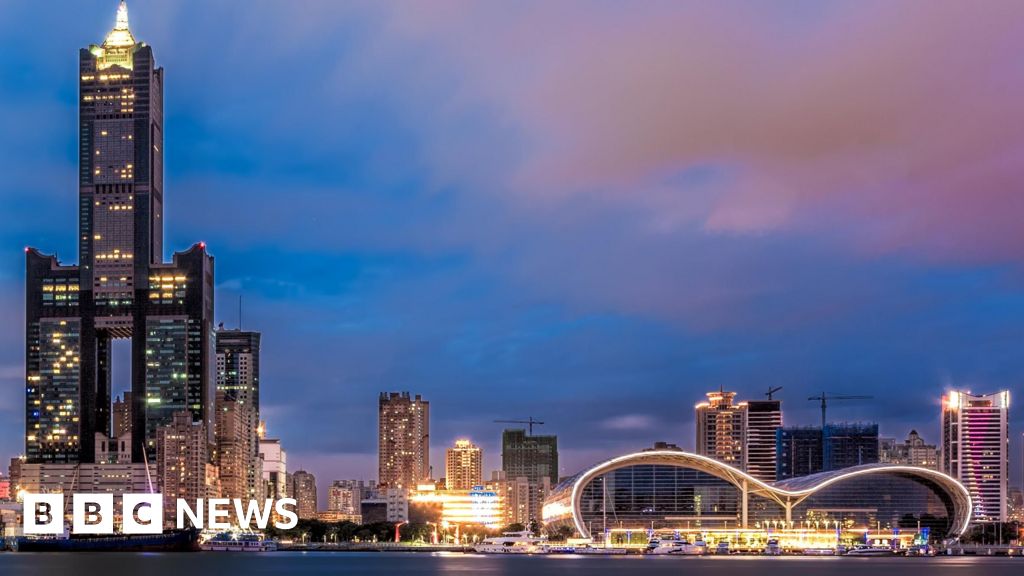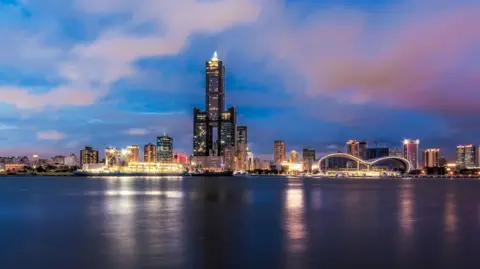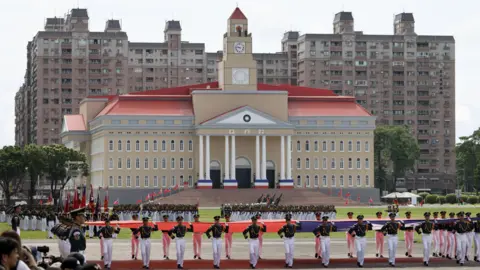Bussiness
Edinburgh shelves Taiwan friendship deal over China sanctions fear

 Getty
GettyThe City of Edinburgh Council has shelved plans for a new “friendship arrangement” with a Taiwanese city following fears it could harm relations with China.
The local authority was due to consider a five-year partnership to strengthen cultural and commercial links between the Scottish capital and Kaohsiung.
A report also raised concerns that it could lead to an increased risk of a cyber attack.
Organisations including the University of Edinburgh, Edinburgh Airport and Edinburgh Chamber of Commerce have warned the move could result in sanctions on the city and reduced trade, tourism and student numbers.
Taiwan considers itself an independent nation, and largely functions as one currently.
This view is not shared by China and most countries, including the US and UK, acknowledge Taiwan as a province of China.
A report admitted the arrangement “does pose potential risks for the city’s relationship with China, but that these risks are difficult to quantify with confidence”.
It added the current threat level to the council of a cyber-attack remained “very high” and signing the arrangement “could increase these risks”.
Deal ‘will bring about serious consequences’
Council leader Cammy Day, who has spearheaded efforts to strengthen relations between Edinburgh and Taiwan, visited Kaohsiung and Taipei on a Taiwanese government-funded trip last year.
In August he secured agreement from councillors to “work towards a memorandum of understanding between Taiwan and the appropriate city partners”.
This has since changed to a “friendship arrangement” built on a “principle of mutual benefit”.
This would seek to “strengthen commercial and innovation cooperation, enrich the cultural and artistic life of both cities”.
However, the plan has been put on hold following concerns being raised in Edinburgh and talks with China.
The Chinese Consul General requested a meeting with Scottish government minister Angus Robertson, which took place on 12 June.
A Scottish government spokesperson said Mr Robertson reiterated to the Consul General that Scottish government policy regarding Taiwan had not changed.
They said: “Any decision on the friendship agreement between the City of Edinburgh and the city of Kaohsiung would be for the council to make, given local authorities are independent of the Scottish government”.
The spokesperson added: “Edinburgh City Council also approached the Scottish government on 14 June to ask for any feedback or comments on a final draft of the paper that was to be considered by the council.
“Officials confirmed in their response that both the UK and Scottish governments affirm that this would be a decision to be made by the local authority and that this position had been communicated to the consulate.”

China’s representative in Edinburgh told councillors he had “grave concerns” about a “sister city agreement between Edinburgh and cities from Taiwan”.
In a letter sent earlier this month, consul general Zhang Biao wrote: “This is not a action simply to promote exchange and friendship, it is deeply related to the Taiwan question and will bring about serious consequences.
“The Chinese government firmly opposes counties that have diplomatic ties with China to conduct official exchanges with Taiwan in any form, including signing agreement with sovereign implications or of an official nature.”
Mr Biao said the council signing a friendship arrangement with Taiwan “will hurt the feeling of the Chinese people and bring about serious consequences to our bilateral relations, which we do not want to see”.
He added: “Surely Edinburgh would benefit little but lose a lot from such action.”
Mr Day said, having taken on board the views of the business community and other partners, they had decided “more discussion is required before taking this agreement forward”.
He said: “We’ll continue this dialogue and report back to a future council meeting.
“In the meantime, I remain in no doubt that developing these types of relationships with progressive and open-minded cities like ours is absolutely the right thing to do for the people of Edinburgh.”
 Rex
RexLetters of support were received from the Kaohsiung City Government, the Taipei Representative Office in the UK and the Scotland Taiwanese Association.
But several organisations urged the council not to sign the arrangement:
- Edinburgh Airport feared it could harm work to increase the number of direct flights to China.
- Essential Edinburgh said there could be sanctions on the city “with consequential impact on future student and visitor numbers from China”.
- Edinburgh Chamber of Commerce emphasised the “success of recent trade missions and the importance of maintaining strong relationships with both Taiwan and China”.
- Edinburgh Hotels Association highlighted the “importance of Chinese visitors and students to Edinburgh’s businesses and tourism economy”.
- And the University of Edinburgh raised “risks associated with the general denigration of relationships with partner bodies in China if the proposed formal arrangement proceeds”.
A spokesman for Edinburgh Airport said the council’s draft report had a lack of detail about the “potential impact of the risks that were alluded to”.
“A range of things were mentioned, such as the current relationship with China and the benefits it brings, and we felt it would be wise for all of us to better understand the potential extent of the risks involved to allow all of us to make a fully informed decision,” he said.
Conservative group leader Iain Whyte said the local authority should focus on “improving the vital local services it provides rather than dabbling ineffectually in international politics”.
He added: “It’s obvious that this needed far more thought before being brought forward as a formal proposal.
“The pause is helpful as it will allow the council to engage more widely should any proposal returns.
“It’s time to focus on Edinburgh people’s priorities.”
Story by Local Democracy reporter Donald Turvill

China’s claim on the island of Taiwan is being pursued with growing assertiveness.
The Beijing government uses its trading clout and diplomatic pressure to block formal recognition by others of the Taipei administration. Only 12 nations now do so, most of them small island states.
In recent years, with China increasing its military spending, Taiwan has been the focus of increased security tensions. There are concerns that China’s armed forces are being prepared for invasion.
To pursue its interests, the Beijing administration and its diplomats around the world exert explicit pressure through trade – threatening to bar products from its markets. China is also suspected of being behind cyber-attacks.
In Scotland’s case, exports include whisky and salmon. Chinese tourist numbers visiting Scotland have increased sharply in recent years, helped by direct flights from Hainan to Edinburgh four times a week through summer. Permission to visit can be cut off.
That threat could be even more serious for Scotland’s universities, which have more than 20,000 Chinese students. Edinburgh University has around 7000 of them, and depends on income from their fees to help pay the wider costs of teaching and researching.
If that source of income were to be switched off by Chinese government diktat to its citizens, it would cause severe budget problems in higher education.












